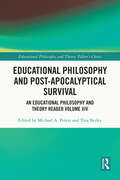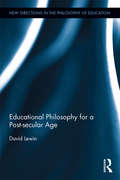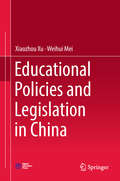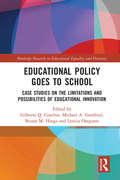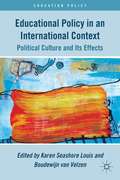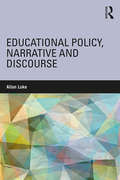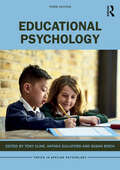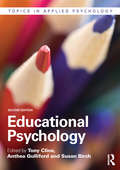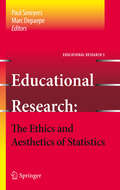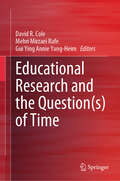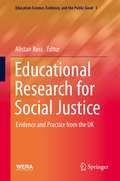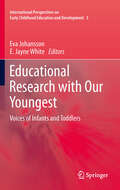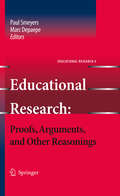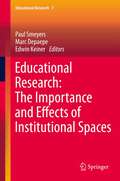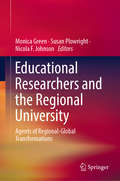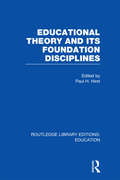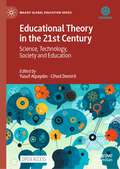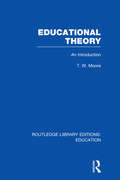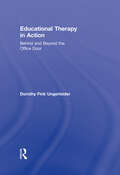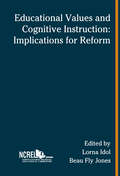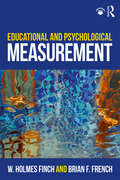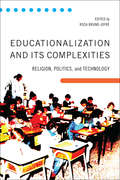- Table View
- List View
Educational Philosophy and Post-Apocalyptical Survival: An Educational Philosophy and Theory Reader Volume XIV (Educational Philosophy and Theory: Editor’s Choice)
by Michael A. Peters Tina BesleyThis collection concerns educational philosophy and post-apocalyptical survival. This 14th volume in the Editor's Choice series provides insights into the philosophy of education as it relates to the concepts of civilizational collapse, discourses of decline, educating for survival amid climate emergency, cultural apocalypse and the pandemic. It is based on a series of editorials and articles published in the Educational Philosophy and Theory journal through its 55-year history. The articles, written by Editor Michael Peters and colleagues, explore the concept of global apocalypse from the educational philosophy lens. It will be of interest to scholars in philosophy of education and anyone who is working in the field of post-apocalyptic studies.
Educational Philosophy for 21st Century Teachers
by Thomas StehlikThis book explores education in the 21st century in post-modern Western societies through a philosophical lens. Taking a broad perspective of education and its attendant terminology, assumptions, myths and influences; the author examines why we teach as opposed to how. In doing so, he includes not only teachers, but all adults who are involved in bringing up children. Applying philosophical theories throughout history to present day practice, this volume is sure to be a useful resource not only for teachers who are just starting out, but those with an interest in education in the past, present and future. This wide-ranging book will be valuable for educators, parents and educational policy makers, and all those who believe it takes a village to raise a child.
Educational Philosophy for a Post-secular Age (New Directions in the Philosophy of Education)
by David LewinEducational Philosophy for a Post-secular Age reinterprets post-secular insights for educational theory by recognising that the persistence of religion in contemporary life raises new questions about the place of religion in education. Two common assumptions are critically examined: first, that the better educated a society becomes, the more secular it becomes, and second, that religion can and should be separated from public education. For too long, religion has had an uneasy relationship with education, being seen either as a foreign invader, a problem to be solved, or as a mechanism by which to reinforce particular religious, cultural or national identities. In order to move educational theory beyond the debates about indoctrination and competing rights between parents, children and nation states, the argument undercuts rationalist conceptions of religion and education that tend to frame the debates in terms of competing truth claims or worldviews. Drawing on a diverse range of theological, philosophical and educational sources, this book demonstrates the continuing significance of the Christian mystical tradition to educational theory. It proposes an exploration of democratic education that brings together two apparently irreconcilable poles: the meaning of religion in education and contemporary life, and the need for a deliberative democratic process that is fit for the post-secular age. It argues that religious literacy can be served by democratic encounters in public religious education. Educational Philosophy for a Post-secular Age will be of interest to researchers, academics and postgraduate students in the fields of the philosophy of education, philosophy of religion, education policy, politics, anthropology and cultural theory. It will particularly appeal to those, of both secular and religious persuasions, interested in the place of religion in education and public life.
Educational Policies and Legislation in China (Zhejiang University Press Ser. #2)
by Xiaozhou Xu Weihui MeiThis book provides a comprehensive overview of the development of educational policies and legislation in China, particularly following the introduction of Reform and Opening Up in 1978. The scope of this book: (1) provides the theoretical basis and framework of educational policies; (2) explains key educational laws and legislation; and (3) introduces readers to policies for educational internationalization, private education, lifelong learning and teacher education. The book is intended for researchers, teachers and graduate students in the field of comparative education, educational policy and legislation, educational management. Readers will find essential information on the most important educational laws and legislation, as well as the recent characteristics of and trends in educational policies in China.
Educational Policy Goes to School: Case Studies on the Limitations and Possibilities of Educational Innovation (Routledge Research in Educational Equality and Diversity)
by Gilberto Q. Conchas Michael Gottfried Briana M. Hinga Leticia OsegueraEducational policies explicitly implemented in order to reduce educational gaps and promote access and success for disenfranchised youth can backfire—and often have the unintended result of widening those gaps. In this interdisciplinary collection of case studies, contributors examine cases of policy backfire, when policies don’t work, have unintended consequences, and when policies help. Although policy reform is thought of as an effective way to improve schooling structures and to diminish the achievement gap, many such attempts to reform the system do not adequately address the legacy of unequal policies and the historic and pervasive inequalities that persist in schools. Exploring the roots of school inequality and examining often-ignored negative policy outcomes, contributors illuminate the causes and consequences of poor policymaking decisions and demonstrate how policies can backfire, fail, or have unintended success.
Educational Policy in an International Context
by Karen Seashore Louis Boudewijn Van VelzenProvides a provocative examination of the interplay between political culture and educational policy. The goal is to provide a better understanding of how different countries are responding to the global exchange of policy ideas that includes 'the standards movement' and 'new public management' or accountability in the public sector.
Educational Policy, Narrative and Discourse
by Allan LukeThis collection of Allan Luke’s key writings on educational policy, curriculum, and school reform follows the development and use of critical discourse analyses to study educational policy and practice. Turning to a series of narrative analyses of the relationship between politics, culture, economics, and education, Luke‘s writings address the challenges of shifting from an academic and scientific critique of policy to ‘getting your hands dirty’ in the making of state educational policy. The volume includes international examples of policy formation for social justice and equity, and closes with an auto-ethnographic view on policymaking and the need for increased critical, sociological evidence-based educational reform. Together with its companion volume, Critical Literacy, Schooling and Social Justice: The Selected Works of Allan Luke, this collection gathers Luke’s seminal key writings spanning the fields of education, applied linguistics, sociology, and cultural studies for the benefit of scholars, students, teachers, and teacher educators around the world.
Educational Psychology (Topics in Applied Psychology)
by Tony Cline Anthea Gulliford Susan BirchNow in its third edition, Educational Psychology offers a comprehensive overview of how key advances in social, developmental and cognitive psychology impact upon the role of educational psychologists working today. Written by leading researchers, the book also explores controversies and dilemmas in both research and practice, providing students with a balanced and cutting-edge introduction to both the field and the profession. Fully revised throughout, and with a new chapter exploring how educational psychologists work with schools to support children and young people’s mental health, this third edition aims to encourage students to integrate their understanding of core psychological disciplines, as well as to consider what ‘evidence-informed practice' really means. Organised into two broad sections related to learning and to social, emotional and mental health, the book features a selection of vignettes from educational psychologists working in a range of contexts, as well as tasks and scenarios to support a problem-orientated approach to study. By integrating both research and everyday practice, the book is unique in engaging a critical appreciation of both the possibilities and limitations of educational psychology. lt is the ideal book for any student wishing to engage with this important and evolving field of study.
Educational Psychology: Topics In Applied Psychology (Topics in Applied Psychology)
by Tony Cline Anthea Gulliford Susan BirchEducational Psychology, Second Edition offers a comprehensive overview of how key advances in social, developmental and cognitive psychology impact upon the role of educational psychologists working today. Written by leading researchers, the book also explores controversies and dilemmas in both research and practice, providing students with a balanced and cutting-edge introduction to both the field and the profession. Fully revised throughout, the new edition is written to encourage students to integrate their understanding of core psychological disciplines, as well as to consider what ‘evidence-based practice’ really means. Organized into two broad sections related to learning and behaviour, the book features a selection of vignettes from educational psychologists working in a range of contexts, as well as tasks and scenarios to support a problem-orientated approach to study. By integrating both research and everyday practice, the book is unique in engaging a critical appreciation of both the possibilities and limitations of educational psychology. It is the ideal book for any student wishing to engage with this important and evolving field of study.
Educational Research - the Ethics and Aesthetics of Statistics
by Paul Smeyers Marc DepaepeStatistics are everywhere. Their power and their undoubted efficacy in many areas have given rise to faith in measurement and metrics. More of them will tell us all that we need to know. Their use carries with it a number of presuppositions: that reality can be satisfactorily represented and that it can be controlled or the risks managed. The papers in this book interpret the ethics and aesthetics of statistics in terms of representation, visualisation and accessibility, focus on the appeal of 'simplicity', of technical languages, numbers, diagrams and pictures, and pay attention to their connection with action plans. The book explores what has made educational researchers dependent on statistics, and deals with their use in areas such as the prevalence of maltreatment of children, European citizenship, well-being and happiness, illegal migrants, and university expansion. There is discussion of how the quest for more and better statistics finds its voice in policy initiatives that become slogans, and how public opinion polls are used to rationalise political decision-making. Can a more limited and modest use be made of statistics which does not deflect attention away from education's core business and which does not destroy the local practical knowledge that on which good education is based? 'Smeyers and Depaepe continue to bring together a significant international group of educational philosophers and historians on topics of importance to researchers. This fifth volume in their series takes up the 'gold standard' use of statistics in case studies not contributed elsewhere. I highly recommend this text to counter a current over-emphasis on technique in research methodology. Use of statistics remains but herein under new, insightful conceptualizations.' Lynda Stone, Philosophy of Education, University of North Carolina at Chapel Hill, USA 'Once again, Depaepe and Smeyers succeeded in bringing together distinguished international and cross-disciplinary scholars exploring very timely and critical issues in current educational research. This is a groundbreaking book on a theme that can't be ignored by educational researchers and those interested in a better understanding of the culture of science and science as culture. Moreover, the present book instigates to study history of educational research, a limited but developing field, and invites reflection to those who are sometimes too reliant on number crunching as a mode of interpretation and rather credulous in the acceptance of institutional records. Frank Simon, Faculty of Psychology and Educational Sciences, Ghent University, Belgium
Educational Research and the Question(s) of Time
by David R. Cole Mehri Mirzaei Rafe Gui Ying Annie Yang-HeimThis book fully explores the question(s) of time in educational research and achieves the acceleration and merging of inquiry with action to understand change and implement these findings through practice. It deals with the philosophy of education, higher education, schooling (the curriculum), time displacement, technology, the environment and policy. This book focuses on time revolution(s). It explores new ways of thinking about time, that question a linear/arrow in time, and sets into motion an educational research agenda to extract revolutions of time. Furthermore, this book figures the dimension of time in teaching and learning by extending and deepening the engagement with time in education. For example, it analyzes the climate crisis in terms of education and how the realization that the climate is changing sits parallel and adjacent to pedagogy. The climate crisis and how to do anything about it through education is an example of how considering the dimension of time opens up education beyond quick or narrow fixes and introduces a profound synthesis for the future.
Educational Research for Social Justice: Evidence and Practice from the UK (Education Science, Evidence, and the Public Good #1)
by Alistair RossThis book presents a series of analyses of educational policies – largely in the UK, but some also in Europe – researched by a team of social scientists who share a commitment to social justice and equity in education. We explore what social justice means, in educational policy and practice, and how it impacts on our understanding of both ‘educational science’ and ‘the public good’. Using a social constructivist approach, the book argues that social justice requires a particular and critical analysis of the meaning of meritocracy, and of the way this term turns educational policies towards treating learning as a competition, in which many young people are constructed as ‘losers’. We discuss how many terms in education are essentialised and have specific, and different, meanings for particular social groups, and how this may create issues in both quantitative survey methods and in determining what is ‘the public good’. We discuss social justice across a range of intersecting social characteristics, including social class, ethnicity and gender, as they are applied across the educational policy spectrum, from early years to postgraduate education. We examine the ways that young people construct their identities, and the implications of this for understanding the ‘public good’ in educational practice. We consider the responsibilities of educational researchers to acknowledge these issues, and offer examples of researching with such a commitment. We conclude by considering how educational policy might contribute to a socially just, equitable and inclusive public good.
Educational Research in China: Articles from Educational Research
by Youchao Deng Baoli GaoThe articles in this book are from Educational Research—the top academic journal in the field of education research in China. It covers education theory and philosophy, basic education, education economy and management and other fields, focusing on the hot and frontier issues of Education in China 2019, such as the development of artificial intelligence and education, the contribution of education to green GDP, rural education teams and policies, vocational education development, and so on.Educational researchers in the college and university, educational policy makers and frontline teaching staff would be interested in it. By focusing on the current hot issues and frontier education issues, the book explores the deep theoretical basis behind the phenomenon, so as to establish in the reader’s mind the connections between theory and practice, China and world.
Educational Research with Our Youngest
by E. Jayne White Eva JohanssonInterpreting the voices of under three year olds is central to early childhood education. Yet entering into their life-worlds is fraught with challenges and unrealised possibilities. This ground-breaking book generates a dialogue about the multiple ways researchers have exploited a range of methods for approaching, accessing, understanding and interpreting infant voice. Each chapter explores the kinds of ethical considerations and dilemmas that may arise in this process. The book itself represents a chorus of international voices (researchers, children, teachers and parents), all adding to a discussion about various circumstances, dilemmas and possibilities involved in doing research with our youngest. This book is an essential read for researchers and teachers alike who seek to 'listen' and 'see' very young children with fresh ears and eyes.
Educational Research: Proofs, Arguments, and Other Reasonings
by Paul Smeyers Marc DepaepeThis book focuses on the language of educational research as well as on the language of education. It conceives both as social practices and investigates how rhetoric plays a part in the complex process of historically situated argumentation. The book aims to answer such questions as: 'What is the nature of the arguments and the kinds of sources one relies on?' and 'What kind of reasoning is offered to convince practitioners?' Taking postmodern criticism seriously, the contributors argue that the scholar or researcher cannot indulge in relativism or be satisfied with a description of particular cases. Instead, theoreticians as well as practitioners have to engage in sound thinking and dialogue. The chapters in this volume highlight relevant characteristics of the language of educational research. In addition, attention is paid to the language of particular debates which figure prominently in the wider educational context, such as the language of goals, of parenting, citizenship and capability.
Educational Research: The Attraction of Psychology
by Paul Smeyers Marc DepaepeThe closely argued and provocative contributions to this volume challenge psychology's hegemony as an interpretive paradigm in a range of social contexts such as education and child development. They start from the core observation that modern psychology has successfully penetrated numerous domains of society in its quest to develop a properly scientific methodology for analyzing the human mind and behaviour. For example, educational psychology continues to hold a central position in the curricula of trainee teachers in the US, while the language of developmental psychology holds primal sway over our understanding of childrearing and the parent-child relationship. Questioning the default position of modern psychology as a way of conceptualizing human relations, this collection of papers reexamines key assumptions that include psychology's self-image as a 'scientific' discipline. Authors also argue that the dogma of neuropsychology in education has demoted concepts such as 'emotion', 'feeling' and 'relationship', so that they are now 'blind spots' in educational theory. Other chapters offer a cautionary analysis of how misshapen notions of psychology can legitimize eugenics (as in Nazi Germany) and poison racial attitudes. Above all, has psychology, with its focus on individual merit, been complicit in hiding the impacts of power and privilege in education? This bracing new volume adopts a broader definition of education and childrearing that admits the essential contribution of the humanities to the proper study of mankind. This publication, as well as the ones that are mentioned in the preliminary pages of this work, were realized by the Research Community (FWO Vlaanderen / Research Foundation Flanders, Belgium) Philosophy and History of the Discipline of Education: Faces and Spaces of Educational Research.
Educational Research: The Importance and Effects of Institutional Spaces
by Paul Smeyers Marc Depaepe Edwin KeinerThis collection of fresh analyses aims to map the links between educational theory and research, and the geographical and physical spaces in which teaching is practiced and discussed. The authors combine historical and philosophical perspectives in examining the differing institutional loci of education research, and also assess the potential and the limitations of each. The contributors trace the effects of 'space' on educational practice in the classroom, in the broader institutions, and in the academic discipline of education--doing so for a range of international contexts. The chapters address various topics relating to the physical and geographical environment. How, for example, does geographical space shape researchers' mental frameworks? How did the learning environments in which young children are taught today evolve? To what extent did parochialism shape America's higher education system? How can our understanding of classroom practice be enhanced by concepts of space? The book acknowledges that texts themselves, as well as the research 'arena', are 'spaces' too, and notes the fascinating debate on the concept of space in the field of mathematics education. Indeed, as more and more students move online, the book analyses the rising importance of virtual spaces such as Web 2.0, which have major educational implications for researchers and students joining the innovative 'virtual' universities of the future. This publication, as well as the ones that are mentioned in the preliminary pages of this work, were realized by the Research Community (FWO Vlaanderen / Research Foundation Flanders, Belgium) Philosophy and History of the Discipline of Education: Faces and Spaces of Educational Research.
Educational Researchers and the Regional University: Agents of Regional-Global Transformations
by Nicola F. Johnson Monica Green Susan PlowrightThis book showcases a compilation of research partnerships produced by the Federation University Gippsland School of Education. Through this book, readers will gain valuable insights into how education research initiatives can help adapt to an age characterized by massive regional/global economic, environmental, identity, cultural and social shifts. The respective chapters address the universal human and researcher condition in a regional setting, highlighting how individuals and groups are seeking to achieve transformation with their regional, educational research. On the whole, the compilation showcases a specific university in a regional context that is now responding to change by rejuvenating, reinventing, re-envisioning and rethinking its research, its identity and its relationality.
Educational Theory and Its Foundation Disciplines (Routledge Library Editions: Education)
by Paul H. HirstAt the time this book was first published the disciplines of philosophy of education, educational psychology, sociology of education and the history of education had developed rapidly. The papers in this volume outline the developments that took place. The first paper analyses the nature of a theory concerned with determining practice and the place of academic disciplines within that. What emerges is the crucial role of these disciplines, but also the need to develop much more adequately a domain of practical principles, assessed and critically reformulated in the light of those disciplines. The following papers are concerned with the contributions four of those disciplines are now making.
Educational Theory in the 21st Century: Science, Technology, Society and Education (Maarif Global Education Series)
by Yusuf Alpaydın Cihad DemirliThis open access book reviews the effects of the twenty-first century scientific-technological and social developments on the educational theory. The first part handles the subject, focusing on technology and educational philosophy. In the second part, the implications of new human and social conceptions towards the education paradigms are examined. In the chapters of the last part of the book, more practical dimensions of education are discussed. Transforming school designs, school management, learning-teaching approaches and teacher competencies are discussed in the context of broader social, cultural and technological changes.
Educational Theory: An Introduction (Routledge Library Editions: Education)
by Terence W MooreThis book comes strongly to the defence of educational theory and shows that it has a structure and integrity of its own. The author argues that the validity of educational theory may best be judged in terms of the various assumptions made in it. His argument is illustrated by a review and critique of some particularly influential theories of education: those of Plato, Rousseau, James Mill and John Dewey. He stresses the need for an on-going, contemporary, general theory of education and examines the ways in which the disciplines of psychology, sociology and philosophy can contribute to a general theory of this kind.
Educational Therapy in Action: Behind and Beyond the Office Door
by Dorothy Fink UngerleiderThis book provides an in-depth look at what a little-known clinician, the educational therapist, does and how they do it. It goes behind the clinician’s door to illustrate the unusual and broad range of interventions – both academic/vocational and social/emotional – that an educational therapist employs. This particular case study involves a young woman named Nora who had a severe but undiagnosed auditory processing disorder. She could not give meaning to the spoken language that came at her too rapidly, leaving her in a constant fog of words that she couldn’t comprehend. This case discloses the problems, their causes, and the emotional toll that had to be considered when developing an effective educational/therapeutic plan for Nora. It vividly illustrates the dynamic exchanges and mutual learning that goes on between client and therapist. Parts I and II illustrate how the psycho-educational interventions that addressed Nora’s academic and non-academic needs were gradually formulated over the first year. Part III provides a series of vignettes from subsequent years that illustrate the ongoing applications of the therapist’s work. Distinguishing Features Explanatory Sidebars – The rationale behind particular techniques and interventions is clarified through a system of explanatory sidebars that inform the reader without distracting from the story. This approach makes the book both an instructional tool well as compelling story. Organic Curriculum – The rationale for and application of an "organic (personalized) curriculum" is explained and applied throughout the book as a model for others to use in working with this population. A Longitudinal Perspective – The initial work with Nora began many years ago, so this book provides a long view of her life and tracks the influences that educational therapy exerted on her development into a fully functioning adult. Cognitive/Emotional Integration – The core of educational therapy – the interdependence of cognitive skills and emotional response – is clearly documented throughout the book. In addition to educational therapy students and practitioners, this book is appropriate for those working in related fields such as special education, school psychology, school counselling, and social work in educational settings.
Educational Values and Cognitive Instruction: Implications for Reform
by Beau Fly Jones Lorna IdolThis volume is a comprehensive guide to state-of-the-art research on thinking, cognitive instruction, social values, and reform. Cognitive instruction for at-risk students is discussed in great detail along with a thorough examination of the teaching of thinking skills from the viewpoint of educational values and school culture. The issues of thinking, learning, and cognitive instruction are linked to the educational reform movement from numerous perspectives. Specifically, the reader can better anticipate which aspects of research on thinking will conflict with existing paradigms and which aspects of schooling will be most resistant to change.
Educational and Psychological Measurement
by W. Holmes Finch Brian F. FrenchThis new text provides the most current coverage of measurement and psychometrics in a single volume. Authors W. Holmes Finch and Brian F. French first review the basics of psychometrics and measurement, before moving on to more complex topics such as equating and scaling, item response theory, standard setting, and computer adaptive testing. Also included are discussions of cutting-edge topics utilized by practitioners in the field, such as automated test development, game-based assessment, and automated test scoring. This book is ideal for use as a primary text for graduate-level psychometrics/measurement courses, as well as for researchers in need of a broad resource for understanding test theory.
Educationalization and Its Complexities: Religion, Politics, and Technology
by Rosa Bruno-JofréThis edited collection brings together scholars from Canadian and international institutions to discuss educationalization, a trend in modern societies that involves transferring social responsibilities onto the school system. This book brings a new dimension to the literature on educationalization by examining the concept in relation to Catholicism, Indigenous issues, the right to education, and historical studies grounded in both Canada and Chile. In these contributions, the book represents an attempt to both deepen the current discussion on the construction and use of educationalization as a concept as well as invite further exploration of this subject in relation to the increasing digitalization of life in the twenty-first century.
